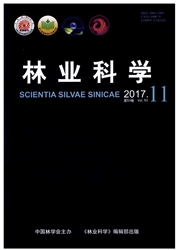

 中文摘要:
中文摘要:
研究苦豆草生物碱对柳蓝叶甲取食的影响。结果表明:苦豆草生物碱总碱及其单体对柳蓝叶甲具有较强的拒食作用,且随着浓度的升高拒食作用增强。在选择性取食条件下,随着总碱处理浓度的升高,试虫对处理叶的取食量迅速下降;而对未处理叶的取食量没有显著的差异,但随着处理浓度的升高,总取食量明显下降。在供试的6种生物碱单体中,苦豆碱和槐胺碱对柳蓝叶甲的拒食活性较强。其中处理浓度为5mg·mL^-1时,在选择性取食条件下,苦豆碱的拒食率高达99.4%,而在非选择性取食条件下,则以槐胺碱的拒食活性较强,达91.7%。
 英文摘要:
英文摘要:
Alkaloids distilled from the weed Sophora alopecuroids was bioassayed with Plagiodera versicolora for their antifeedant effects. The feeding of the insect was strongly inhibited by the total alkaloids and their monomers, with the higher concentrations having stronger antifeedant effects. In choice bioassays, the food intakes of the insect decreased rapidly with the higher concentrations of the total alkaloids. There were no differences among the food intake of non-treated leaves. However, the total food intake decreased significantly with increasing of the alkaloid concentrations. Among the six alkaloids tested, aloperine and sophoramine had stronger antifeedant effects on Plagiodera versicolora. In the non-choice experiments, 99.4% antifeedant rate was observed when the leaves were treated with 5 mg· mL^- 1 aloperine, while in choice bioassays, sophoramine antifeedant showed stronger antffeedant effects with the antifeedant rate 91.7%.
 同期刊论文项目
同期刊论文项目
 同项目期刊论文
同项目期刊论文
 期刊信息
期刊信息
